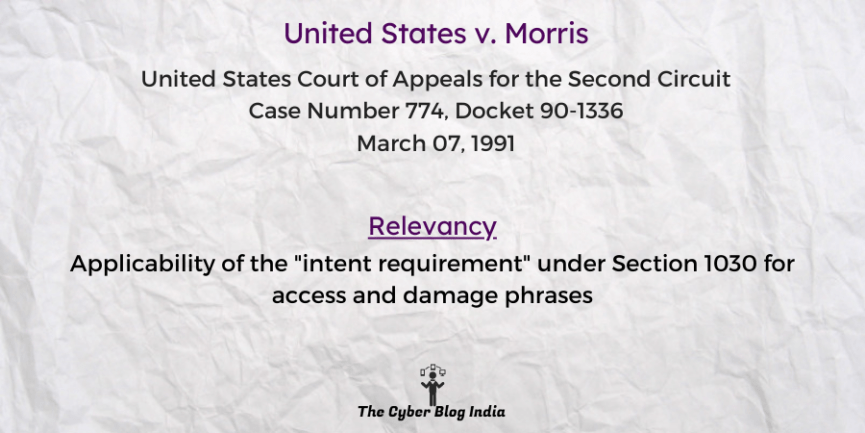United States v. Morris

United States v. Morris
928 F.2d 504 : 59 USLW 2603
In the United States Court of Appeals for the Second Circuit
Case Number 774, Docket 90-1336
Before Circuit Judge Newman, Circuit Judge Winter, and District Judge Daly
Decided on March 07, 1991
Relevancy of the Case: Applicability of the “intent requirement” under Section 1030 for access and damage phrases
Statutes and Provisions Involved
- The Computer Fraud and Abuse Act, 18 U.S.C. § 1030 (“CFAA”)
Relevant Facts of the Case
- The case involves an appeal related to the interpretation of Section 2(d) of the Computer Fraud and Abuse Act of 1986. This provision punishes intentional unauthorised access to “federal interest computers” causing damage or loss of $1,000 or more.
- The appellant released a computer program known as a “worm” into the INTERNET, a national computer network, aiming to demonstrate security vulnerabilities in computer networks.
- The appellant, a first-year graduate student at Cornell University, had authorisation to use computers at Cornell. However, he intentionally designed the worm to spread across the national network, causing various educational and military computers to crash.
- The key issues in the appeal were whether the government needed to prove the appellant’s intent to prevent the authorised use of the computer’s information and cause loss and what constituted “access without authorisation” under Section 1030(a)(5)(A).
Prominent Arguments by the Counsels
- The appellant’s counsel relied on the legislative history. He argued that Congress’ careful consideration of the mental state requirement for similar provisions in the CFAA indicates that the intent requirement applies to both accessing and damaging.
- The respondent’s counsel argued that the intent requirement in Section 1030(a)(5)(A) applies only to the accesses phrase and not to the damages phrase. Punctuation, specifically after the comma, indicates a clear legislative intent to apply the intent requirement solely to the act of accessing.
Opinion of the Bench
- Sufficient evidence is available for the jury to conclude that the appellant accesses computers without authorisation.
- The District Court has rightly sentenced Morris to probation, communication service, fine, and supervision costs.
Final Decision
- The court upheld the district court’s judgment.
Aditi Mangesh Sawant, an undergraduate student at NMIMS Kirit P Mehta School of Law, Mumbai, prepared this case summary during her internship with The Cyber Blog India in January/February 2024.
